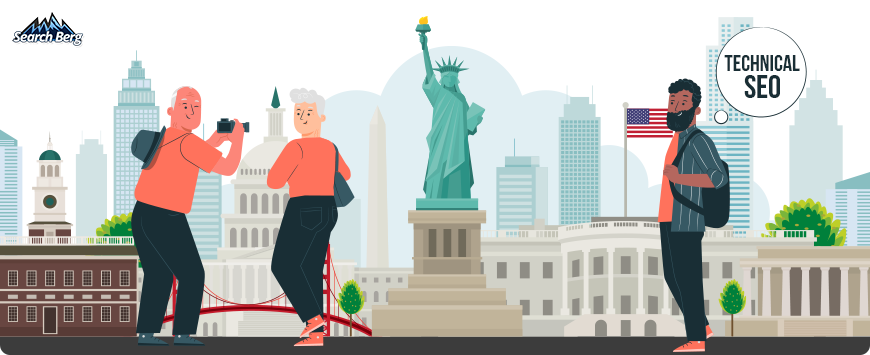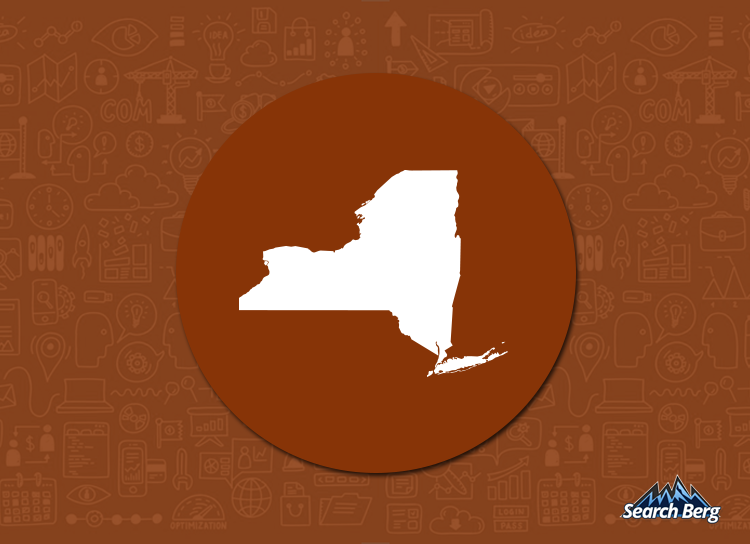How to Master Technical SEO in New York: An Insider’s Guide

In the grand scheme of SEO, three players take center stage: on-page, off-page, and the often-shadowed star, technical SEO.
While the first two often steal the spotlight, the third, technical SEO, forms the backbone of your online presence. It’s the silent powerhouse fueling site speed, user experience, and your website’s handshake with search engines.
Why focus on it? The rewards are undeniable: soaring search engine rankings, a flood of engaged users, and a fortified foundation that supports all your SEO strategies.
Now, let’s talk New York, the big league of digital competition. Technical SEO isn’t just another item on the checklist for New York businesses; it’s a survival kit in the concrete jungle of online search. In New York, a city where every second on the internet counts like a New York minute, fine-tuning the technical aspects of your website can help you unlock jaw-dropping visibility.
What we’re rolling out today isn’t your run-of-the-mill guide; it’s a treasure map to the El Dorado of technical SEO penned by a New York insider. Are you ready to master the technical SEO ropes in New York? Let’s go!
1. Wait, What is Technical SEO?

When we hear “SEO,” our minds often jump to keyword stuffing and link building campaigns.
But there’s a silent (often invisible) player in this game: technical SEO. It’s like the wizard behind the curtain in the Land of Oz: the one pulling all the strings to make the magic happen but rarely getting the applause.
So, what exactly is technical SEO? It’s the nuts and bolts of your website. Think of it as the foundational elements that, while not always visible to the naked eye, are critical for search engine success. It encompasses the technical aspects of your website that influence its visibility in search engines.
Technical SEO covers a range of areas, from your site’s crawlability (how easily search engine bots can navigate and index your content) to the speed at which your pages load (every second counts). It ensures that your website is structured in a way that search engines can understand and appreciate. This includes a well-organized site architecture, optimized URLs, effective use of robots.txt, and efficient sitemaps.
But why is it so important? Because just launching a great product or service isn’t enough if your potential customers can’t find you online. Technical SEO is the bridge that connects your content with your audience. Technically sound websites enjoy higher rankings, increased traffic, and, ultimately, more conversions.
In a world where Google’s algorithms are more complex than a New York subway map, technical SEO helps you navigate the twists and turns. It helps you speak the language of search engines: a language that’s constantly evolving.
But there’s more. Technical SEO also enhances user experience. A fast-loading, easy-to-navigate, and responsive website isn’t just good for search engines; it’s a delight for users, too. And in the digital era, user satisfaction is paramount. After all, what good is a website if it frustrates visitors more than a traffic jam on the Brooklyn Bridge?
It’s important to remember that mastering technical SEO isn’t a walk in the park. It’s a complex process that requires experience, expertise, and a wide SEO skillset. Instead of taking the reins yourself, which may be tempting, turn to a trusted SEO company in New York.
This is where an SEO agency like Search Berg can serve as your helping hand. As a team of experts, we’ll craft a personalized technical SEO plan that helps you rise on Google search engine result pages (SERPs), get seen by your target audience, make more sales, and remain in Google’s good books.
2. Why Does Technical SEO Matter for My New York Business?
Speed is king in the city that never sleeps. New Yorkers are known for their fast-paced lifestyle (and this extends to their online behavior). If your website takes more time to load than it takes for a New York minute to pass, you’ve lost the race before it even began.
Speed optimization, a critical component of technical SEO in New York, ensures your website loads at lightning speed. The outcome? You’ll keep your audience engaged and reduce your site’s bounce rate.
Next, consider the mobile revolution. In New York, more people are likely to browse your website on their smartphones while riding the subway than on a desktop at home. Optimizing for mobile use is a great way to ensure your site looks and performs impeccably on smaller screens. You’ll provide a seamless experience to your audience whether they’re in a coffee shop in Manhattan or on a ferry to Staten Island.
Now, let’s talk crawlability and indexing. Search engines are the bloodhounds of the internet; they’re adept at sniffing out and indexing content. Technical SEO ensures your website is easily discoverable and understandable to these digital sniffers. It’s almost as if you’re turning your website into an open book with clear navigation and structured data. Search engines will be able to easily index your content without hitting a dead end.
Technical SEO also includes optimizing your website for local search (which is essential in a city as geographically diverse as New York). This means when someone searches for “best pizza in Brooklyn” or “boutique hotels in SoHo,” your business will pop up. You’ll become visible in your local community and mark your territory in New York’s digital map.
Now that we have a good grasp of the basics, let’s get down to the nitty-gritty of technical SEO in New York. How can you master these complex ropes? Which areas demand your focused attention? We’re breaking it all down.
3. Website Speed Optimization: The New York Minute Standard

Understanding the pivotal role of website speed in New York is essential. You can’t just keep pace with technological advancements and call it a day; you must carefully align with the city’s inherent impatience and expectation for instantaneity.
New Yorkers don’t just appreciate speed; they demand it. A website that takes longer than a few seconds to load risks losing traffic, enraging customers, and, ultimately, losing business opportunities. The reality is stark: slow sites result in audience loss.
But what exactly contributes to a website’s speed? It’s a combination of factors. Large images can bog down your site’s speed. Every extra second your images take to load is a tick against user engagement. Image optimization is, therefore, not just a recommendation; it’s a necessity. This means compressing images for faster loading times while maintaining their quality. You must ensure visual appeal doesn’t come at the cost of performance.
Another vital aspect is the use of browser caching. It’s like giving your repeat visitors an express pass; they don’t have to wait in line every time they visit your site. By storing elements of your site locally in the user’s browser, you can dramatically reduce load times for those returning visitors, enhancing their overall experience.
Also, think about the number of HTTP requests your website makes. Every piece of your website, from images to stylesheets, involves an HTTP request. More requests mean more loading time. Minimizing these requests is a great way to clear the path for a faster journey. This involves streamlining your site’s elements and combining files where possible to boost efficiency without sacrificing content quality.
Content delivery networks (CDNs) are another game-changer in the New York market. A CDN stores copies of your site’s content on servers around the world; it allows users to access the content from the nearest server. This is particularly beneficial in a geographically diverse city like New York. By distributing the load, CDNs reduce the stress on any single server and decrease the time it takes for your content to reach the user.
Let’s not overlook the impact of server response time. Your hosting solution plays a significant role in this. Shared hosting may be economical, but it can slow down your site (especially during peak traffic). Upgrading to a dedicated or cloud-based server can significantly improve response times. Speak with your SEO company about this.
JavaScript and CSS also contribute to your site’s loading time. Optimizing and minifying these files can remove unnecessary characters and whitespace. By reducing their size, you’ll speed up their loading. It’s like trimming the fat off your site’s code; the leaner it is, the faster it moves.
How can you tell if your website meets the New York minute standard? Tools like Google’s PageSpeed Insights provide a detailed analysis of your site’s performance on both mobile and desktop devices. They score your site and offer actionable recommendations for improvement. Site speed testing and monitoring are also imperative. This is a continuous process (much like keeping up with New York’s ever-changing trends).
Implementing these speed optimization techniques can lead to remarkable improvements. How so?
Let’s say a prominent online fashion store in Manhattan implements image optimization and server upgrades. They compress their high-resolution images without losing visual quality and move their website to a faster server. The result is a 35% reduction in load times. This change enhances the user experience and results in a 25% increase in page views and an 18% uptick in sales conversions.
See what we mean? But the impact doesn’t stop at retail.
Consider a local news portal focusing on New York City events and stories. Their slow-loading pages leave them with a frustratingly high bounce rate. In response, they optimize their JavaScript and CSS, implement browser caching, and adopt a CDN. This effort slashes their average page load time from a sluggish 6 seconds to a brisk 2 seconds. The result? There was a significant 40% drop in bounce rate and a 20% rise in average session duration. Their readers now enjoy rapid access to news and articles, remain engaged, and keep coming back for more.
Each of these examples showcases the transformative power of speed optimization in a city that values time as a currency. In New York, where every second on your website can make or break a user’s decision to engage, optimizing for speed is a critical strategy for business survival and success. Implementing these techniques revolutionizes how users interact with your site. A few fixes here and there can turn fleeting visits into meaningful engagements and, ultimately, conversions.
Brilliant, isn’t it? We think so, too. Work with an experienced SEO company in New York to master these ropes.
4. Mobile Optimization in the City That Never Sleeps

You’ll find a smartphone in every New Yorker’s hand in 2024.
The modern smartphone is a gateway to endless interactions and transactions. For businesses, mobile optimization isn’t just a matter of adapting to a smaller screen; it’s about tapping into the lifestyle of a city that never slows down.
The focus is on creating seamless experiences that resonate with mobile users. What’s the right way to go about that in New York’s digital ecosystem? We’re about to show you the way.
4.1. Responsive Design
In 2024, responsive design isn’t a luxury anymore. It ensures a website dynamically adjusts its layout, images, and content to fit various screen sizes and devices.
The outcome? An optimal viewing experience. This adaptability is essential in a city where people rely heavily on mobile devices for both personal and professional purposes.
A non-responsive website in New York is like a Broadway show that can only be viewed from one seat in the theater; it limits the audience and diminishes the experience. For a New York business, this translates to lost opportunities and a decreased user base. On the other hand, responsive design is like having a show that can be viewed perfectly from every seat. This means you walk away with maximum reach and engagement.
Furthermore, responsive design significantly impacts SEO. Search engines like Google prioritize mobile-friendly websites in their rankings. In a city where competition for visibility is fierce, falling behind in mobile optimization can mean being invisible in search results.
The technical aspects of responsive design involve fluid grids, flexible images, and media queries. These elements work together to create a website layout that effortlessly scales up or down to ensure that functionality and aesthetics are preserved across devices. This approach enhances usability and contributes to faster loading times (a critical factor in retaining the attention of fast-paced New Yorkers).
Investing in responsive design is investing in the future. As the variety of devices and screen sizes continues to grow, having a website that can adapt to these changes is vital. For New York businesses, it means staying relevant and accessible in a city where change is the only constant.
Since things can get a little tricky here, we recommend turning to the experts for help. Consult your SEO agency and request them to incorporate responsive design into your technical SEO checklist. Ideally, they should have done this already. When you let professionals take care of site responsiveness, you can rest assured that your website will adapt seamlessly to New Yorkers’ diverse screens.
Recommended: Premium Responsive Web Design Services
4.2. Optimizing for Mobile User Experience
In a city where people are often browsing on the go, whether it’s on a crowded subway car or while walking through bustling streets, the mobile experience you offer must be intuitive, quick, and responsive to the unique demands of a fast-paced lifestyle.
What’s central to optimizing for mobile user experience? Clever design that puts user requirements at the forefront. This means crafting a mobile interface that’s visually appealing and highly functional.
The key is in the details. We’re talking large, readable, easily clickable buttons that prevent the frustration of mis-taps. The text must be readable without zooming, the menus must be streamlined for ease of navigation, and the layout should be decluttered to focus on essential content.
These elements are critical in a city where users may be exploring your site with just one hand while holding a coffee in the other. The design should facilitate quick interactions. Web users in New York are often looking for information rapidly (whether it’s checking the latest sale on their favorite eCommerce site or looking up the menu of a nearby restaurant).
Let’s not forget that mobile user experience in New York demands accessibility. Your mobile site must be navigable and understandable for people with varying abilities. This includes voice search optimization, screen reader compatibility, and ensuring that interactive elements are easily accessible.
These features will broaden your reach and demonstrate a commitment to inclusivity (an attribute highly valued in the melting pot of New York City). As we mentioned earlier, SEO services are the way to go here. Turn to SEO experts in New York who can rework your website to bolster its technical mobile capabilities.
5. Advanced Schema Markup for a Diverse Audience

Schema markup, often referred to as structured data, is the behind-the-scenes code you can add to your website’s HTML to enhance how your pages are represented across search engine result pages (SERPs).
Think of it as the seasoning that enhances the flavor of your website’s presentation in search results. It can include information like addresses, phone numbers, ratings, prices, and even more nuanced data like event schedules or product availability.
For a New York business, this means you can showcase your offerings directly in the search results, whether that’s a Broadway show schedule, menu items from a restaurant in Brooklyn, or available real estate listings in Manhattan.
But why is this particularly important for New York businesses? The city’s populace is a melting pot of cultures, languages, and interests. By implementing schema markup, you’re essentially tailoring your content to speak directly to this diverse audience.
For instance, if you run a gallery in Chelsea, schema markup can help highlight your current exhibitions, opening hours, and artist information right in the search results. For a tourist or a local art enthusiast looking for a weekend activity, this information becomes instantly accessible and engaging.
Advanced schema markup can significantly impact your local SEO efforts. New York City, with its five boroughs and countless neighborhoods, is a labyrinth of businesses vying for attention. Structured data helps in clearly defining your business’s locality and relevance to specific New York areas.
Whether someone is searching for the “best bagels in Upper East Side” or “flower shops near Central Park,” marking up your business’s detailed information gives you a better shot at appearing in these targeted local searches.
Schema markup also plays a critical role in enhancing the mobile search experience. The majority of New Yorkers rely on their mobile devices for information on-the-go. Clearly defining and presenting your content in an easy-to-read format in search results is invaluable. Schema markup ensures that the relevant details like address, operating hours, or upcoming events are displayed prominently.
In addition to improving visibility in search results, schema markup also aids in voice search optimization. As more New Yorkers turn to digital assistants for information, structuring your website data clearly has become imperative.
When someone asks Siri, Alexa, or Google Assistant for recommendations or specific information, the results are often based on the structured data provided by websites. For example, a voice search query like “What time does the Metropolitan Museum close today?” can be accurately answered if the museum’s website has the correct schema markup.
Schema markup can also be a game-changer for eCommerce websites in New York. Product schema allows you to provide specific information about your products directly in the search results, including price, availability, and reviews.
In a city where online shopping is as common as taking the subway, being able to present your products with detailed information at the very first interaction point, the search result, can significantly boost click-through rates and conversions.
However, implementing schema markup requires a nuanced approach. It’s not just a matter of adding data; you must add relevant, accurate, and precise data that enhances the user’s search experience. This involves understanding the various types of schema and how they apply to your specific content. Tools like Google’s Structured Data Markup Helper can be invaluable in this process.
That’s not all. We also recommend partnering with seasoned SEO experts in New York who possess a deep understanding of the nuances of structured data and how it aligns with the latest search engine algorithms. They have the expertise to identify the most relevant and impactful types of schema markup for your specific business and audience.
For instance, an SEO expert can discern whether a local business would benefit more from a local business schema or a breadcrumb schema. This will help ensure that your website communicates the right information in the most effective way.
It’s also worth noting that SEO professionals stay abreast of the ever-evolving standards and practices in the SEO world. Staying compliant with these changes is key to maintaining and improving your search engine rankings.
Collaborating with SEO experts also means that the implementation of schema markup is done accurately and efficiently. They can foresee potential issues, provide solutions, and conduct thorough testing to ensure that the markup boosts your visibility in search results and enhances user experience.
Find an experienced SEO company that provides top-notch SEO services in New York. This measure will help you stay ahead of the curve.
6. Leveraging Local SEO: Dominating the Five Boroughs

In New York City, a global hub with distinct boroughs, effective local SEO is essential for businesses aiming to stand out in specific neighborhoods.
This city’s unique layout, where each borough has its own demographic and cultural identity, demands a tailored approach to local search engine optimization.
In Manhattan, businesses must cater to a high-end market. In Brooklyn, a more eclectic and diverse audience prevails. Queens, celebrated for its cultural diversity, requires a strategy that appeals to various ethnic communities. The Bronx, rich in history and community spirit, and Staten Island, with its suburban feel, also present unique opportunities for localized digital marketing.
How can you ensure that your business optimally appears in local searches? Let’s break it down.
6.1. Understanding Each Borough’s Local Landscape
New York City’s five boroughs each present unique SEO landscapes. A one-size-fits-all approach simply won’t work; you need tailored strategies to engage with your local audience effectively.
Manhattan: As the economic powerhouse of the city, Manhattan’s SEO strategy should be centered around high-competition keywords, reflecting its high-density business environment. Local businesses should focus on luxury-oriented keywords that cater to a wealthier demographic. For instance, restaurants and retail stores in Manhattan would benefit from highlighting exclusive offerings, premium services, or unique experiences in their SEO tactics.
Brooklyn: Known for its diverse culture and artistic vibe, Brooklyn requires a more community-focused SEO strategy. Keywords relating to artisanal, boutique, and local experiences resonate well with this borough’s audience. Brooklyn-based businesses should engage with local events, cultural festivals, and community projects in their SEO content. This can enhance their local relevance and appeal to the borough’s eclectic residents.
Queens: Queens is celebrated for its ethnic diversity. Local businesses must leverage multicultural and multilingual SEO strategies. Consider using keywords and content that appeal to the various communities residing here. For instance, a restaurant in Queens may focus on authentic cuisine specific to a particular culture and utilize relevant keywords in different languages to attract a diverse clientele.
The Bronx: This borough has a rich historical and cultural heritage. Local businesses must leverage these. Incorporating keywords related to local landmarks, historical events, and community initiatives can be effective. Businesses in the Bronx should focus on building a strong local presence by engaging with community events and emphasizing their contributions to the borough’s cultural and social landscape in their online content.
Staten Island: With its more suburban character, Staten Island’s local SEO strategy should focus on family-oriented and community-based keywords. Businesses here can benefit from emphasizing family-friendly services, local schools, and community events. Keywords that highlight the borough’s residential nature can appeal to the local population’s preferences.
In each borough, understanding the local search trends and user behavior is key. Utilize tools like Google Analytics and Google Trends to gain insights into what residents are searching for. This will help you tailor your technical SEO strategy accordingly.
6.2. Local Technical SEO Tips
To excel in local SEO within New York City’s diverse boroughs, you must master the technical aspects of your digital presence. Here are some advanced local technical SEO tips to help you achieve higher online visibility and attract local customers effectively:
Optimize for Mobile-First Indexing: With Google’s mobile-first indexing, your website’s mobile version is considered the primary source for ranking and indexing. Ensure your site is mobile-friendly, loads quickly on mobile devices, and offers an excellent user experience. AMP implementation, responsive design, and optimizing images for mobile are key components.
Local Structured Data Markup: Implement structured data markup using Schema.org to provide detailed information about your business, including NAP data, opening hours, product/service details, and customer reviews.
Local SEO Audits: Frequently conduct technical audits of your website to identify and fix issues that may impact local search rankings. Use tools like Google Search Console, Google Analytics, and Search Berg’s SEO audit software to monitor your site’s health and performance.
Google Business Profile (GBP) Optimization: Claim and optimize your Google Business Profile (previously known as Google My Business) listing for each physical location. Provide accurate NAP information, choose relevant categories, upload high-quality photos, and encourage customer reviews. Consistency across GBP listings is imperative.
Local Link Building: Build high-quality backlinks from authoritative local websites, directories, and organizations. Focus on local partnerships, sponsorships, and collaborations to earn relevant and valuable local backlinks.
Localized Content: Create localized content that speaks to your target audience’s interests and needs in specific boroughs or neighborhoods. Mention local landmarks, events, and news in your content to enhance relevance.
Voice Search Optimization: Optimize your website for voice queries by providing natural-sounding answers to common questions related to your business and location.
Local SEO Tracking and Reporting: Implement robust tracking and reporting systems to monitor the performance of your local SEO efforts. Track local keyword rankings, website traffic, online reviews, and conversion metrics to measure your success.
Online Reputation Management: Manage your online reputation by actively responding to customer reviews (both positive and negative). Address customer feedback promptly and professionally to build trust and credibility in the local community.
Local SEO Schema Plugins: If you’re using a content management system (CMS) like WordPress, consider using local SEO schema plugins to simplify structured data markup implementation.
Local Citations Cleanup: Frequently audit and clean up your local citations to ensure consistency in your NAP data across various online directories and platforms.
User Experience (UX) Enhancement: Improve your website’s user experience by ensuring easy navigation, clear calls to action (CTAs), and an intuitive design. A positive user experience can result in higher engagement and conversions (win-win!).
7. Elevate Your New York Business with Expert Technical SEO in New York
When it comes to mastering technical SEO in the bustling and competitive landscape of New York City, you need a trusted partner who understands the city’s unique dynamics and can deliver results.
Search Berg, a leading SEO company with a strong presence in New York, is here to help you circumvent the hurdles of technical SEO and propel your business to the forefront of SERPs.
Our team of experienced SEO experts is well-versed in the technical nuances that can make or break your online visibility. We specialize in optimizing websites for mobile-first indexing, implementing structured data markup to enhance search engine understanding, and crafting local SEO strategies catering to the city’s diverse demographics.
Our mission is clear: to elevate your business by harnessing the power of SEO services in New York. We recognize that in the city that never sleeps, businesses must stand out, and that’s precisely what our services aim to achieve.
Are you ready to take your New York business to new heights? Whether you’re a local eatery in Brooklyn, a boutique in Manhattan, or a tech service provider in Queens, our strategies are designed to cater to your specific needs. Schedule a free consultation today!












